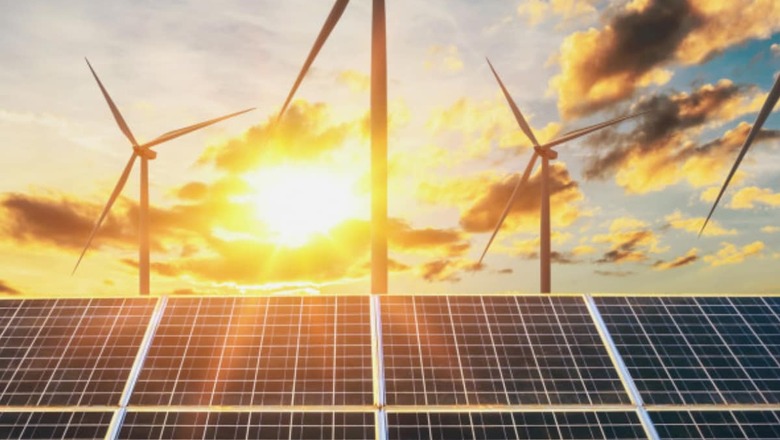
views
This year ONGC Institute of Petroleum Safety, Health and Environment Management (IPSHEM) in Goa will play host to the second edition of the India Energy Week scheduled from February 6-9. Prime Minister Narendra Modi is all set to inaugurate the event, which will see the convergence of ministers, policymakers, decision-makers, academics, entrepreneurs, and business leaders.
At the event, the PM will engage with CEOs from the oil and gas industry, and there will also be an India-US investment roundtable.
The IEW was born out of PM Modi’s longstanding vision for India’s role in the global energy transition while ensuring energy security, affordability, and accessibility for citizens. It is held with the support of the Ministry of Petroleum & Natural Gas, and aided by the Federation of Indian Petroleum Industry (FIPI).
At IEW 2024, over 350 exhibiting companies will connect with a diverse audience of over 35,000 energy professionals. This platform will facilitate the creation of meaningful connections, the fostering of collaborations, the unveiling of innovations, and the exchange of insights crucial to shaping the future of India’s energy landscape.
This year’s event will focus on sustainable aviation fuel (SAF) technologies, CCUS technologies, waste-to-energy, and the production of value-added products, niche chemicals, crude-oil-to-chemicals (COTC), and the evolution of green hydrogen (GH2) production technologies.
IEW presents a golden opportunity to showcase these energy developments and serves as a platform for fostering further growth and development in the energy sector.
Through expert-led deliberations, this event will set the narrative for a smooth energy transition in India, considering the global scenario in the years ahead, and India’s energy agendas and sustainable development goals.
Who’s coming
IEW 2024 will host 17 energy ministers from different countries, drawing a crowd of over 35,000 attendees and featuring more than 900 exhibitors.
Minister of Petroleum and Natural Gas Hardeep S Puri disclosed plans to showcase six dedicated country pavilions from Canada, Germany, the Netherlands, Russia, the UK, and the USA, emphasising the international scope of the event.
A noteworthy addition to IEW 2024 is the special Make in India pavilion, with over 300 exhibitors displaying innovative solutions spearheaded by Indian MSMEs in the energy sector. The total number of exhibitors for this year’s event is expected to be more than 900 (30 per cent more than last time).
Technical sessions have expanded, with the number of submitted papers doubling from 1,000 for IEW 2023 to 2,000 for IEW 2024. Adding new technical categories such as shipping, logistics & supply chain, manufacturing & industrialisation, future mobility, and mining & minerals, the event aligns with domestic priorities.
The Avinya Energy Startup Challenge organised by the Ministry of Petroleum and Natural Gas for startups from the energy sector, has selected five startups from around 120 applications. The winners of the challenge will be provided inter-alia mentorship opportunities by industry leaders, and an opportunity to exhibit their startup ideas at India Energy Week 2024, showcasing their cutting-edge solutions to a global audience.
Building upon the success of the inaugural IEW, the organisers have extended the duration and increased the number of strategic sessions. IEW’24 (Forecasted) will feature a 44% increase in sessions, comprising 46 strategic sessions and 46 technical sessions, more than double the technical sessions held in IEW’23.
In line with India’s G20 priorities, organisers are planning several events on the sidelines of IEW that will address crucial themes such as Global South Cooperation and Carbon Capture and Utilisation.
Some of the ministers who will be present at the IEW are:
- Kanchana Wijesekera, Minister of Power and Energy, Sri Lanka
- Vickram Bharrat Minister of Natural Resources, Republic of Guyana
- Flavien P Joubert, Minister of Agriculture, Climate Change and Environment, Seychelles
- Yonis Ali Guedi, Minister of Energy and Natural Resources, Republic of Djibouti
- Mohamed M Oun, Minister of Oil & Gas, State of Libya
- Haitham al-Ghais, Secretary General, OPEC
Major corporations present at IEW will include IndianOil, GAIL, BPCL, Oil India, Petronet LNG, ExxonMobil, Petrobras, Reliance Industries Limited, and many more.
The event showcases India’s importance to the energy sector around the globe as well as puts it in a leadership position to drive the field and find solutions to mitigate climate change.
India’s Energy Agenda And Sustainable Development Goals
India has announced its goal to achieve net-zero emissions by 2070 and to derive fifty per cent of its electricity needs from renewable energy sources by 2030. The nation is already well into the clean energy transition, surpassing its commitment made at COP21 Paris Summit by achieving 40 per cent of its power capacity from non-fossil fuels nearly nine years ahead of schedule.
The proportion of solar and wind in India’s energy mix has experienced remarkable growth. Due to technological advancements, consistent policy support, and a dynamic private sector, the construction of solar power plants has become more cost-effective than coal plants. As of data made available by the Ministry of Power, total non-fossil fuel which includes hydro, solar, wind, nuclear, etc, make up about 43 per cent of all power generation capacity in India or 179,322 MW.
Renewable electricity is expanding at a faster pace in India compared to other major economies, with projections indicating a doubling of new capacity additions by 2026. Additionally, India stands as one of the world’s largest producers of modern bioenergy, with ambitious plans to increase its utilisation across various sectors.
The International Energy Agency (IEA) anticipates India surpassing Canada and China in the coming years, becoming the world’s third-largest ethanol market after the United States and Brazil.
Embracing clean energy represents a significant economic opportunity, with India poised to emerge as a global leader in renewable batteries and green hydrogen. These low-carbon technologies, among others, have the potential to generate a market valued at up to $80 billion in India by 2030. International community support is crucial for steering India’s development towards a low-carbon trajectory.
To achieve net-zero emissions by 2070, the IEA estimates an annual investment requirement of $160 billion, three times the current levels, across India’s energy sector until 2030. Hence, securing access to low-cost, long-term capital is pivotal for achieving net-zero goals, thus making the India Energy Week a crucial platform.
Green hydrogen will play a pivotal role in reaching net-zero and decarbonising challenging sectors. India aspires to establish itself as a global hub for green hydrogen production and exports. The country aims to create a demand for 5 million tonnes of green hydrogen, replacing grey hydrogen in refineries and the fertiliser sector, resulting in the abatement of 28 million tonnes of CO2. As the green hydrogen economy matures, this proportion is expected to grow, contributing to the abatement of 400 million tonnes of CO2 by 2050.
Policies And Initiatives
Over 9 years, the government has transformed the power sector from being power-deficient to power-sufficient by adding 1,94,394 MW of generation capacity. The current installed power generation capacity stands at around 4,26,132 MW. Of the total generation capacity added in the current year 2023-24, which is 9,943 MW, 1,674 MW is from fossil fuel sources, and 8,269 MW is from non-fossil fuel sources.
To promote sustainable cooking, MNRE is supporting the installation of biogas plants and their use as alternative fuels for cooking purposes across the country, including rural areas, under the National Biogas Programme.
During IEW 2023, the Prime Minister dedicated the twin-cooktop model of the IndianOil’s Indoor Solar Cooking System and initiated its commercial roll-out. This revolutionary indoor solar cooking solution operates on both solar and auxiliary energy sources simultaneously, providing a reliable cooking solution for India.
The government, with various objectives such as reducing import dependence, saving foreign exchange, promoting the domestic agriculture sector, and realising associated environmental benefits, has actively advocated for the blending of ethanol in petrol under the Ethanol Blended Petrol (EBP) programme. A successful ethanol blending programme has the potential to save USD 4 billion per annum.
At the G20 summit last year, PM Modi officially launched E20, a blend of 20 per cent ethanol with petrol, at 84 retail outlets of Oil Marketing Companies in 11 states/UTs, marking a step towards the government’s goal of achieving 20 per cent ethanol blending in the overall petrol supply by 2025-2026.
Various government agencies have rapidly implemented measures to establish a favourable regulatory and retail ecosystem for the safe and effective use of ethanol-blended petrol. The formation of the Global Biofuels Alliance (GBA) aims to address major challenges and unlock the potential of biofuels.
The National Biofuels Coordination Committee has announced the implementation of the CBG Blending Obligation (CBO) to enhance the production and consumption of Compressed Biogas (CBG) in the City Gas Distribution (CGD) sector, focusing on CNG (transport) and PNG (domestic) segments.
The CBO will shift from voluntary to mandatory blending, beginning in the fiscal year 2025-26. Phased in at 1 per cent, 3 per cent, and 4 per cent for fiscal years 2025-26, 2026-27, and 2027-28, respectively, the blending obligation will be fixed at 5 per cent from 2028-29 onwards. The CBO aims to stimulate CBG demand, reduce reliance on LNG, contribute to forex savings, promote a circular economy, and aid in achieving net-zero emissions, attracting investments of around Rs 37,500 crore for 750 CBG projects by 2028-29.
On February 3, the Ministry of New & Renewable Energy (MNRE) issued the ‘Scheme Guidelines for implementation of Pilot projects for use of Green Hydrogen in the Shipping Sector’ under the National Green Hydrogen Mission, marking a significant step towards advancing sustainable maritime practices. Additionally, MNRE announced comprehensive guidelines for implementing pilot projects that focus on integrating green hydrogen in the steel sector.
The Prime Minister has also announced Pradhanmantri Suryodaya Yojana, a solar-based energy programme that will enable one crore houses to get 300 units of free electricity every month. It’s part of the number of initiatives and policies undertaken by the government in order to meet the commitment of net zero by 2027.
IEW 2023
India Energy Week 2023 emerged as the primary event during India’s G20 presidency and was organised under the tagline ‘Growth, Collaboration, Transition’, from February 6-8, 2023, in Bengaluru.
PM Modi, accompanied by Petroleum Minister Hardeep S Puri and other dignitaries, including Karnataka Governor Thawar Chand Gehlot, Karnataka Chief Minister Basvaraj Bommai, and Minister of State for Petroleum and Natural Gas Rameshwar Teli, inaugurated the event.
In his inaugural speech, the Prime Minister outlined four major strategies for the energy sector: increasing domestic exploration and production, diversifying the supply, expanding biofuels, ethanol, compressed biogas, and solar, and promoting decarbonisation through electric vehicles and hydrogen.
The event highlighted India’s growing prominence as a powerhouse in energy transition. Ministers, CEOs, and energy leaders acknowledged the resilience of India’s energy sector and its potential as an emerging demand centre, appreciating the country’s roadmap for energy transition while meeting domestic needs.
During IEW 2023, PM Modi announced various initiatives, including the introduction of a renewable energy-powered cooktop and the ‘unbottled’ initiative by Indian Oil. A Green Mobility Rally was also organised, featuring 57 vehicles running on sustainable energy sources such as E20, E85, Flex Fuel, Hydrogen, and Electric.
Conclusion
India Energy Week (IEW) 2024 holds paramount importance as it emerges as a pivotal platform for global energy dialogue, collaboration, and innovation. The event serves as a testament to India’s commitment to clean energy transition, sustainability, and meeting global climate goals.
The event serves as a stage for not only showcasing India’s energy developments but also for facilitating collaborations, meaningful connections, and the exchange of insights crucial for a smooth energy transition.
As India continues to spearhead initiatives such as the National Green Hydrogen Mission, CBG Blending Obligation, and various other policies and programmes, IEW 2024 becomes a focal point for the discussion, deliberation, and advancement of sustainable energy practices. With a keen focus on renewable energy, biofuels, and green hydrogen, IEW 2024 positions India as a key player in the global energy landscape and emphasises its commitment to driving solutions for mitigating climate change by reaching its SDGs.



















Comments
0 comment